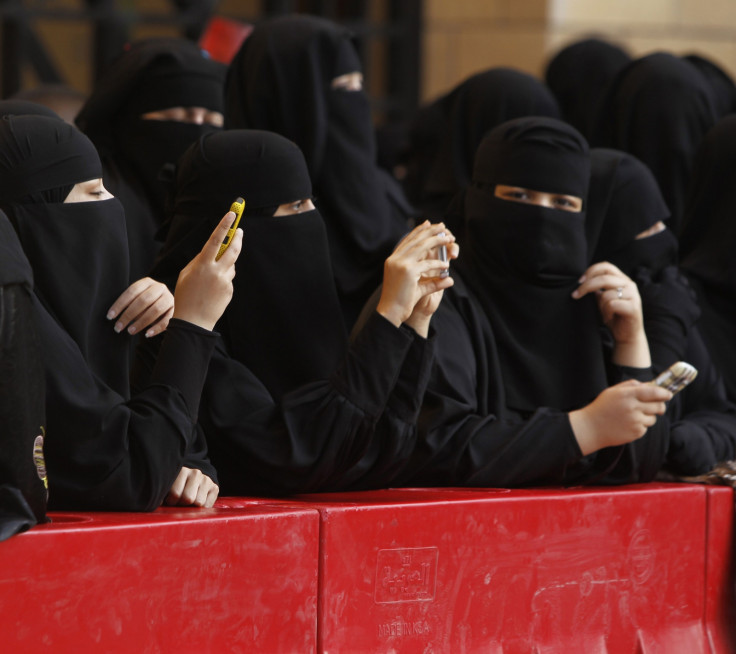Saudi women launch Twitter campaign demanding end to male guardianship
The campaign, promoted by Human Rights Watch, has received overwhelming response.
The plight of women in Saudi Arabia is no secret matter with women still prohibited from making independent decisions without the supervision and/or permission of their legal male guardians. Now, scores of Saudi women are taking to Twitter to demand the end of the male guardianship system with the #TogetherToEndMaleGuardianship hashtag.
The social media campaign was promoted by Human Rights Watch (HRW) and is aimed at highlighting the oppressive and prohibitive nature of the guardianship system. Over 170,000 tweets in both English and Arabic have been posted, Voactiv reported.
"In Saudi Arabia, a woman's life is controlled by a man from birth until death. Every Saudi woman must have a male guardian, normally a father or husband, but in some cases a brother or even a son, who has the power to make a range of critical decisions on her behalf," HRW said in its report.
I live in a country that I can't go anywhere until my husband permit it
— أسمهان (@Asmahan61) August 2, 2016
I'm dying here I just eat & sleep#سعوديات_نطالب_باسقاط_الولايه6
#StopEnslavingSaudiWomen #TogetherToEndMaleGuardianship #سعوديات_نطالب_باسقاط_الولايه10 what a crime! https://t.co/VcLOGPYRKa
— Lama â§#كلنا_شهد⩠(@TheLamaas) August 4, 2016
The English social media campaign led to a larger response in Arabic. The hashtag #سعوديات_نطالب_باسقاط_الولايه (which translates as 'Saudi women demand the end of guardianship') was created by Twitter users merely two weeks after the English campaign was launched, and gathered steam, reaching almost 140,000 tweets. Both the English and the Arabic hashtags are still trending inside Saudi Arabia.
can't study abroad without a stupid signature from a man, how is it acceptable to crash my dreams and future? #TogetherToEndMaleGuardianship
— alaa | Øرة (@lolitaxo_) July 31, 2016
The report also highlighted that women in Saudi Arabia are compelled to ask permission from their male guardians to "travel, marry, or exit prison" and are often required to have a male member of the family present when conducting a variety of everyday transactions like renting an apartment, filing legal claims and others.
It’s Time to End Male Control of Saudi Women https://t.co/aAbUxPajSl by @K_Beckerle #TogetherToEndMaleGuardianship pic.twitter.com/CeeONPScjO
— Human Rights Watch (@hrw) July 26, 2016
"The impact these restrictive policies have on a woman's ability to pursue a career or make life decisions varies, but is largely dependent on the good will of her male guardian. In some cases, men use the authority that the male guardianship system grants them to extort female dependents. Guardians have conditioned their consent for women to work or to travel on her paying him large sums of money," the report said.
Does it make sense to REQUIRE women to get permission from male guardians to travel? #TogetherToEndMaleGuardianshiphttps://t.co/cQT0ZDyJev
— Human Rights Watch (@hrw) July 18, 2016
The guardianship system also imposes obstacles for women attempting to pursue educational and professional opportunities both within and outside the country. Women are not allowed to apply for passports, study abroad without their guardian's consent and must sometimes even have a male relative accompany them "throughout the course of their studies".
The report features three videos created by HRW, which were inspired by the accounts of 61 women interviewed by the organisation. The videos have since been shared on Twitter numerous times. The campaign is similar to the Women2Drive campaign launched in 2011, which also gathered steam on Twitter and saw numerous women take to the streets, behind the wheel, defying the ban on women driving. Like the male guardianship system, the Saudi government is yet to lift the ban on women driving.

© Copyright IBTimes 2024. All rights reserved.























